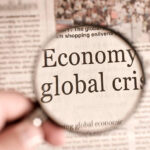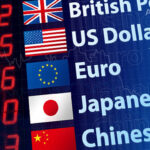Published March 24, 2022 11:29 am est
by Richard F. Cason,

Editor in Chief,
NewsMovesmarketsForex®.
Key Issues–
- Friday Economic Central Bank News closes with a bang March 24, 2023 BOE Modest rate increase 0.25 bps to 4.25 percent on March 23, 2022, by MPC 7-2 vote
- Swiss National Bank raised on Wednesday rates by .50 bps to 1.50% due to inflationary concerns looming over the 2.00% mandate currently at 3.4% escalated by rising electricity and food
- U.S. Federal Reverse FOMC increase interest rates by 0.25 bases point to 4.25%, still fighting persistent inflationary concerns
- U.S. Banking Crises in Tech Sector Quailed with Federal Reserve adding need liquidity through the implementation of the New Banking Term Funding Program
- Labor market has been tight however in the short term GDP and employment are likely to be somewhat stronger than expected
- Euro Zone Energy price inflation continue to decline anchored by lower wholesale gas prices
- Euro Zone Wage growth in the Euro area has continued to increase as well
Expert Central Bank Analysist by World Renown ADM Investor Services International Chief Economist Marc Ostwald
Marc Ostwald who is an expert Chief Economist & Global Strategist with ADM Investor Services International head quartered in London England,  gives his insights and opinion on this weeks global central banks economic recap news events, Mr. Ostwald eloquently stated that:
gives his insights and opinion on this weeks global central banks economic recap news events, Mr. Ostwald eloquently stated that:
********************
** EVENTS PREVIEW **
********************
‘The week ends with a relatively busy schedule of statistics, with G7 ‘flash’ PMIs, UK GfK Consumer Confidence and Retail Sales and US Durable Goods Orders providing the headlights, while a gaggle of ECB, Fed and BoE speakers feature on the events schedule.
In terms of the latter the focus will be on their messaging in the wake of all delivering expected rate hikes, seemingly confirming that they see no trade-off between fighting inflation and financial stability concerns.
But market rate expectations have shifted sharply, with the Fed now expected to have cut rates by nearly 100 bps by the end of 2023, the ECB seen hiking rates just once more this year, while the BoE is expected to hike rates once more, but to reverse this by year end (see charts).
A degree of calm has returned to equity markets, while the widening in credit spreads has been halted, but remains substantially wider than prior to the SVB collapse – per se risk appetit e has stabilized, in no small part helped by Fed liquidity provisioning. Yesterday’s weekly Fed Balance Sheet report (see table and chart) saw a further rebound of $100Bbln, bringing the total increase in the past fortnight to $400 Bln, in effect reversing 60% of the QT reduction.
e has stabilized, in no small part helped by Fed liquidity provisioning. Yesterday’s weekly Fed Balance Sheet report (see table and chart) saw a further rebound of $100Bbln, bringing the total increase in the past fortnight to $400 Bln, in effect reversing 60% of the QT reduction.
In the detail, the take-up of the Bank Term Funding Program rose sharply to $53.66 Bln vs prior week $11.9 Bln, and mirrored effectively by a $42 Bln reduction in Discount Window borrowing, though this remains very high at $110.2 Bln (vs. just 4.6 Bln a month ago).
It is worth noting that for all the volatility above all in rates, that there has been, overall US financial conditions have in fact been entrenched in a well-defined range (see chart) since the end of November, underlining that this has not been a broad systemic crisis, but rather a shift in where assets are held, with money market funds and GSIBs seeing substantial inflows, while regional banks witnessed outflows; counterparty risk remains high on agenda.
It should be added that flows are one thing, but do not offer any specific detail on how much lending standards have tightened. On balance, it remains the case that overall excess liquidity remains high, but market liquidity remains thin, and volatility on a knife edge, i.e. still just another negative headline or rumour away from a reignition of fear.
G7 flash PMIs are forecast to see a modest improvement in Manufacturing, albeit still mostly contracting, and a slight setback in most Services readings after some modest strength in February.  Much may depend on data collection timing, given some risk of contagion effects to non-financial sentiment from the ‘banking crisis’. Prices sub-indices will require particular monitoring, given the easing in both oil and gas prices.
Much may depend on data collection timing, given some risk of contagion effects to non-financial sentiment from the ‘banking crisis’. Prices sub-indices will require particular monitoring, given the easing in both oil and gas prices.
U.K. data overnight saw an as expected pick-up in Gfk Consumer Confidence to a still very down at heel -36 from -38, paced by economy expectations (-62 vs. -65) and Major Purchases Climate (-33 vs. -37), though notably seeing a renewed dip in Personal Finances Expectations (-21 vs. -18). By contrast Retail Sales were much stronger than expected at 1.2% m/m, with an upward revision to January to 0.9% from 0.5%, with notable strength in Food (0.9% m/m), Non-specialized Stores (5.5% m/m, boosted above all by Discount Stores) and a 2.9% m/m rebound in Clothing & Footwear. As with the US, UK consumer spending is showing some resilience despite cost of living pressures, though the strength in discount store sales underlines that challenges clearly remain.
US Durable Goods Orders are forecast to rise a tepid 0.2% m/m both on headline and the core CapEx proxy Non-defence Capital Goods ex Aircraft, the latter slowing from 0.8% in January, and predicated on ISM Manufacturing Orders (47.0 vs. Jan 42.8) remaining weak, and suggesting unsurprising caution on the sector CapEx outlook. But with banking concerns still very much at the forefront of market concerns, this will have to spring a surprise to have anything more than a passing impact”.
“Busier un of data as markets tentatively stabilize: focus on PMIs,
UK GfK survey and Retail Sales, US Durable Goods, Brazil IPCA-15
inflation and Canada Retail Sales; ECB, Fed and BoE speakers
– UK: GfK picks up, but more a case of less pessimism than optimism,
Retail Sales strength underlines resilience message, though discount
store strength highlight ongoing cost of living challenges
– US Durable Goods seen posting marginal gain, as businesses remain
cautious on Cap Ex outlook
– USA: high level of Fed discount window borrowing, jump in BFTP usage
reverses much of Fed QT, underlines fragility and counterparty risk
concerns
– Attachments: Fed, ECB and BoE rate expectations by meeting; Fed Balance
sheet chart and weekly statement; US IG and HY Credit spreads; US Senior
Financials average credit spreads: US Financial Market Conditions”
For more Developing intriguing Central Bank Stories be sure to visit our Central Bank Breaking News Here:  News Moves Markets Forex “real time digital currency news”, works to provide market intelligence, connecting our audience with a mix of the most latest insightful currency news in the Foreign exchange markets. Providing the Latest and the greatest in depth developing global central bank stories and financial news to traders and investors around the continent.
News Moves Markets Forex “real time digital currency news”, works to provide market intelligence, connecting our audience with a mix of the most latest insightful currency news in the Foreign exchange markets. Providing the Latest and the greatest in depth developing global central bank stories and financial news to traders and investors around the continent.
Connecting People to the markets through the power of information from a Black perspective.
Expert Economist: Marc Ostwald an expert Chief Economist & Global Strategist with ADM Investor Services International
Marc Osterwall is a world renowned Expert Economist who Analyzes and forecast macro/microeconomic trends and central bank policies on a exponential economic level. Mr. Osterwall is a regular guest on Bloomberg BNN, HT & Radio, BBC, CNBC, Le Fonti International and is widely quoted on newswires, newspapers, and other digital media worldwide. He is also a regular conference speaker and guest lecturer at various universities.








